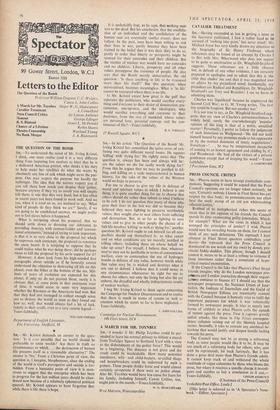Letters to the Editor
Ihe Question of the Bomb Prof es,or William Empson, C. C. Wrigley, Canon L. John Collins
March for Mr. Toynbee Major W. GI Shakespeare
Cavalier Treatment A. Comerford Press Council Critics Sir Linton Andrews Honour George Edinger R. S. Rintoul James L. McDonald
Chance of a Lifetime Robin Marris
Theatre Censorship Wayland Young
No Bank Merger J. A. Hunsworth
THE QUESTION OF THE BOMB
SIR,--To understand the mind of Mr. Irving Kristol, I think, one must realise (and it is a very different thing from imputing low motives to him) that he is a dedicated American patriot, who thinks it his duty to help make her satellite's do what she wants by absolutely any line of talk which might serve the pur- pose. One may respect the purpose but hardly the technique. The idea that the natives respect you if you tell them how much you despise their jabber, because anyway if they try to revolt you will simply kill them, is one that dies very hard; but it has often in recent years not been found to work well. And we too, when it is tried on us, are inclined to say, 'What kind of people do they think we are?' Surely, if we are going to be annihilated anyway, we might prefer not to feel slaves before it happened.
What is intriguing about his proposal, that we should settle down to devoting our substance to providing America with cannon-fodder and 'conven- tional armaments,' instead of trying to look important, is that it is so very close to the proposal for which he expresses such contempt, the proposal to renounce the atom bomb. It is tempting to suppose that he could realise what he was doing there; did he perhaps mean to kill the proposal by his eerie support for it?
However, it does look from his high-minded first paragraphs about suicide as if he honestly cannot understand the objection to destroying all life on this planet, even the fishes at the bottom of the sea. Mil- lions of years of evolution are expected for this planet, if only we do not prevent them; surely it is obvious that, at some point in that enormous tract of time, it would cease to seem very important whether the Russians or the Americans had won. But that they had just managed to collect enough sense not to destroy the world as soon as they found out how to; well, that would always feel a bit of luck, faintly to their credit, even as a very remote legend.— Yours faithfully,
WILLIAM EMPSON Department of English Literature, The University, Sheffield, 10














































 Previous page
Previous page